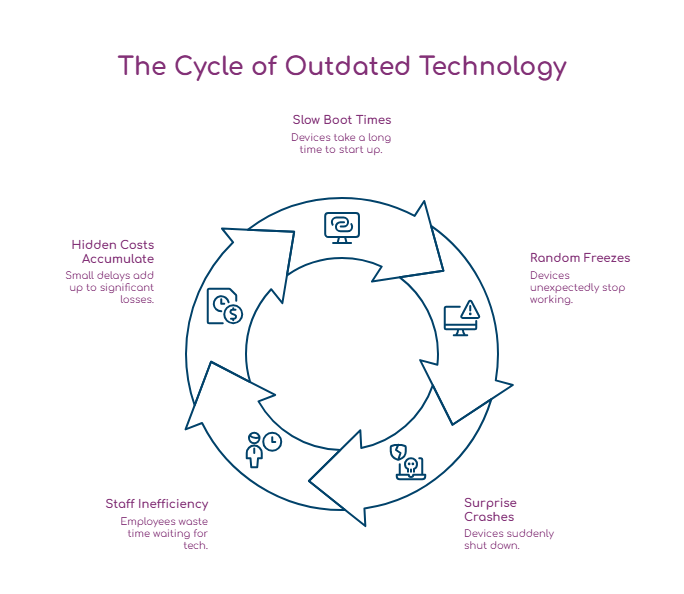Newton Abbot is buzzing. From the independents tucked along Queen Street, to the trades darting between jobs. From the estate agents juggling viewings and phone calls, to the cafés keeping the town fuelled with caffeine. It’s a proper mix of busy, brilliant businesses.
But behind the counter, under the desk, or hidden in the back office; there’s often a quiet little gremlin at work.
Not the cinematic kind that multiplies when you spill water on it! We mean the subtle, everyday troublemakers: the sluggish logins everyone has just accepted. The dodgy WiFi that only works if you stand in exactly the right spot. The software that crashes only on a Thursday, but no one knows why.
These things don’t cause immediate, obvious chaos. They chip away. A few seconds here, a few minutes there… multiplied across a whole team, every single day.
Most Newton Abbot businesses don’t even realise they’re being slowed down – because when tech hiccups are constant, they start to feel normal.
Let’s peel back the curtain on those silent productivity killers. The ones that quietly drain time, money, and morale, and the ones we see all the time across the town. Let’s shine a light on them, so your business can finally move at the pace you expect.
Small issues, big impact.
Outdated or Unreliable Systems
Some Newton Abbot businesses are still running on devices old enough to remember Woolworths on Courtenay Street.
Slow boot times, random freezes, surprise crashes? They’re all part of the daily ritual.
The worst bit? Everyone just gets on with it.
A machine that takes 10 minutes to wake up doesn’t feel disastrous, until you multiply that across five staff members, every morning, all year.
Those “it’ll only take a minute” delays quietly stack up like an overstuffed in-tray. Suddenly your team is losing hours each week simply waiting for tech to behave.
Unfortunately, the hidden cost of “making do” is bigger than most people realise.

Slow or Inconsistent IT Support
You know that feeling when you log a ticket and you feel as though it disappears into the abyss? Or when you call for help and are promised a callback but hear nothing until next Tuesday?
When support moves slower than the problem, everything stalls:
- Orders can’t be processed
- Staff twiddle their thumbs
- Customers get frustrated
- Managers get stressed
And you – the poor business owner trying to keep it all together, don another hat and consult Google to try and find a fix.
Downtime stops being an inconvenience and becomes a full-on operational kink in the hosepipe.
Overly Complicated Setups
Lots of local businesses are running “Frankenstein systems”.
Pieced together over time, your IT is added to, patched up, duct-taped over, and reinvented half a dozen times by whoever last touched the network. Resulting in a setup so complex that only one person in the office knows how it works (and they end up being on annual leave when something goes wrong).
Staff end up avoiding tools because they’re confusing, or simply don’t work.
Teams create makeshift workarounds (“Just export it, re-save it, then upload it again – it usually works”).
Productivity drains away in a thousand tiny cuts.
The tech isn’t helping the business, the business is working around the tech.
Lack of Proactive Maintenance
“If it aint broke, don’t fix it.”
Famous last words.
Most hidden tech problems don’t arrive with a fanfare, they simmer quietly:
- Backups stopped working months ago (and no-one’s noticed).
- Antivirus expired quietly in the background.
- Firewall was disabled becuase that software stopped working.
- Updates were postponed “just for now”.
- A hard drive is dying slowly but silently (and ready to take its precious data with it).
- The WiFi AP Firmware has never been updated.
Then one Tuesday afternoon everything falls over – causing a domino effect, for which there is no longer a single, simple solution.
Proactive maintenance is the boring hero of IT. It’s not glamorous, but it’s the difference between smooth sailing, and panicked phone calls during your busiest hour.
Connectivity & Communication Bottlenecks
Poor Broadband and Network Reliability
If there’s one thing that can turn a perfectly good workday into a test of patience, it’s when the internet drops.
And Newton Abbot has its fair share of pain points – patchy coverage on the rural outskirts, overloaded infrastructure around the high street, and industrial estates where the connection feels like it’s still auditioning for dial-up.
We end up dealing with cloud apps that lag just when you need them, video calls that freeze on the least flattering frame, and card machines that take so long to authorise a payment you start wondering if you should offer the customer a cup of tea while they wait.
For businesses that rely on the cloud (which is nearly everyone now), unreliable broadband doesn’t feel like a minor irritation – it’s a bottleneck. A daily productivity tax.
Because when your internet connection has the stability of a jelly on a trampoline, everything slows down.
Outdated Phone Systems & VOIP Hesitancy
Phones are still the heartbeat of so many local businesses – estate agents, trades, salons, hospitality, professional services.
But relying on ageing phone systems means missed calls, crackly audio, or the classic “Sorry, my signal’s poor” routine.
Modern businesses and customers alike, expect flexibility:
- Call routing
- Mobile apps
- Remote extensions
- Quick responses
- Clear audio (preferably without the sound of seagulls in the background, but we can’t fix everything…)
Yet many businesses hesitate to switch to VOIP because it sounds complicated or risky. Yet, in reality, it’s often simpler, clearer, more flexible and far more reliable than clinging to old analogue systems.
If your phone system feels like it belongs in a museum exhibit titled “The Early Days of Telecoms,” it’s probably time to modernise.
Cybersecurity & Data Risks (Often Ignored Until Too Late)
Cybersecurity isn’t just something big corporations worry about on page 42 of their risk assessment. For small businesses in Newton Abbot, it’s usually the thing that gets pushed to “when we’ve got time”, which is exactly how trouble sneaks in.
These risks don’t usually announce themselves with flashing red lights and a Mission Impossible soundtrack. They creep in quietly, building in the background, until one day, well, have a read here if you want to see how this plays out.
Weak Cybersecurity Foundations
A surprising number of businesses are still running on what we politely call “hope-based security” – hoping nothing goes wrong, hoping no one gets hacked, hoping the passwords everyone shares on a Post-it note remain a secret forever.
We regularly see:
- No MFA (so one stolen password = full access)
- Weak or repeated passwords (no, ‘louvre’ is not a secure password)
- Antivirus that expired last spring
- No reliable backups
- Staff who don’t know what a phishing email looks like
All it takes is a single breach – a dodgy link clicked under pressure, a password leaked, an account compromised – and suddenly you’ve got locked files, lost data, or a customer database held hostage.
And these aren’t rare, dramatic Hollywood-style attacks.
They’re small, avoidable incidents with very real consequences: downtime, panic, lost files, awkward phone calls to clients, and a lot of unnecessary stress.
Strong cybersecurity isn’t about being paranoid – it’s about giving your business a fighting chance.

Software Not Being Updated
Software updates are like dental check-ups: nobody looks forward to them, everyone delays them, and ignoring them usually leads to pain.
We still come across:
Unsupported operating systems that haven’t seen a security patch since the days of Windows 7
Old versions of Office that wheeze every time you try to open a spreadsheet
Bespoke systems, built years ago that no one knows how to maintain (often described as “Don’t touch it! It still works… mostly”)
When software stops being supported, vulnerabilities pile up, and hackers love outdated systems. It’s like leaving your front door unlocked with a sign saying “Back in 10.”
And even if security isn’t the issue, slow and outdated systems drag productivity down, frustrate staff, and eventually force you into a rushed, last-minute upgrade that costs more than doing it properly in the first place.
Keeping software up to date is one of the simplest ways to stay secure – and one of the most commonly ignored.
The Hidden Financial & Strategic Impact
Tech issues don’t always show up as big, dramatic failures. More often, they’re tiny irritations – barely noticeable at first – that quietly drain money, time, and energy from your business.
Individually, they seem harmless.
Collectively, they’re costly.
The Cumulative Cost of Small Delays
Slow logins. Frozen screens. WiFi that cuts out the moment the office gets busy.
Support tickets that take hours (or days) to get a response.
Individually, these hiccups feel like little more than a shrug and a muttered “typical.”
But stack them together across a whole team and suddenly you’re losing hours each week to tech friction.
And it’s not just time – it’s morale.
When staff are battling sluggish systems, constantly waiting for something to load, or tiptoeing around temperamental software, frustration builds.
People feel less productive, less motivated, and more stressed. Not because the work is hard, but because the tools are.
That hidden drain on productivity? It’s costing far more than the occasional crash ever will.
Growth Bottlenecks
For start-ups and small Newton Abbot businesses, momentum matters.
You’re competing with established players, online giants, and every other business within a 20-mile radius trying to stand out.
But growth stalls when your tech can’t keep up.
Systems not talking to each other slow down workflows.
Outdated hardware limits what your team can actually achieve.
Poor connectivity makes remote work painful.
Lack of modern communication tools means missed leads.
Clunky processes take time away from customer service and sales.
When tech isn’t aligned with how your business operates, everything feels slightly harder than it should.
Instead of supporting your growth, it quietly holds it back (like trying to run a marathon in your wellies.)
Customer Experience Takes a Hit
From estate agents to cafés to local trades, customer expectations are sky-high, and tech influences their every interaction with you.
Slow website? People click away.
Delayed response to an enquiry because email is misbehaving? They go elsewhere.
Card machine timing out at the till? Awkward apology, frazzled staff, frustrated customer.
Even tiny pieces of tech friction show up externally, and customers rarely blame “the computer.” They assume it’s the business.
A smooth, reliable tech setup isn’t just an operational advantage – it’s part of your brand. It keeps customers happy, confident, and coming back.
How Newton Abbot Businesses Can Unstick Themselves
The good news? None of these tech hiccups are irreversible.
In fact, most can be sorted with a few sensible steps that don’t require ripping everything out and starting again.
Here’s what actually makes a difference:
Refresh Ageing Hardware
If your devices sigh louder than you do on a Monday morning, it might be time for an upgrade.
Modern machines don’t just run faster – they’re more secure, more stable, and save hours of waiting over the course of a week.
Even swapping out one or two of the slowest culprits can transform productivity.
Simplify Overly Complicated Systems
If you need a treasure map to figure out how your systems connect, it’s too complicated.
Streamlining processes, removing old software, and standardising tools can instantly remove friction. The goal is to make tech fade into the background so staff can focus on their work.
Invest in Reliable Support
You don’t need support that sounds like a call centre three counties away.
You need someone who responds quickly, understands your setup, and actually solves issues without a two-week turnaround.
Reliable support saves more money than it costs because downtime is expensive, often eye-wateringly so.
Improve Broadband and WiFi
Good connectivity isn’t a luxury anymore.
Whether you’re processing card payments, running cloud apps, or jumping on video calls, a stable connection is essential.
Sometimes the fix is a better business-grade broadband line.
Other times it’s a proper WiFi setup instead of that “router balanced on a filing cabinet” arrangement.
Schedule Regular Health Checks
A quick look-over every so often can catch problems long before they become expensive emergencies.
Think of it like an MOT for your tech (you wouldn’t wait for your brakes to fail before getting them checked…would you!?).
These reviews highlight:
- Failing hardware
- Outdated software
- Gaps in security
- Misconfigured networks
- Backup issues
- System bottlenecks
A small bit of attention upfront prevents a whole lot of chaos later.

Upgrade Communication Tools
If your phone system is older than some of your staff, it’s probably time for a rethink.
VOIP brings clearer calls, flexible routing, mobile apps, and fewer missed opportunities. All without the crackling, dropping, or line noise.
And it doesn’t have to be overly complicated or costly.
Prioritise Cybersecurity Basics
You don’t need a fortress, just the fundamentals:
- Multi-factor authentication
- Strong, unique passwords
- Supported operating systems
- Up-to-date antivirus
- Reliable, tested backups
These basics stop the majority of threats before they even begin.
A Gentle Note from Us
As a small local team working with Newton Abbot businesses every day, we see these issues constantly. Not because people aren’t trying, but because tech is rarely the priority until it causes pain.
A few smart tweaks can make a world of difference.
If you ever want a hand figuring out where to start, we’re always happy to take a look.

To Sum Up
The tech hiccups slowing down Newton Abbot businesses aren’t dramatic, headline-grabbing issues.
They’re the everyday snags (the slow logins, jittery broadband, ancient systems, clunky tools, and support that takes just a bit too long) that quietly drain time, energy, and momentum.
Individually, they look harmless.
But together they cost hours of productivity, frustrate staff, chip away at customer experience, and nudge growth off course.
The good news is that none of this is unusual. And none of it is difficult to fix.
A few smart changes (faster hardware, simpler systems, better connectivity, stronger security, and reliable support) can turn a sluggish setup into something that genuinely helps your business move faster.
If you’re reading this and thinking, “This sounds uncomfortably familiar…”, you’re not alone. Most local businesses only realise how much time they were losing once things finally start running smoothly.
If you’d like a quick, friendly chat about where your own systems might be holding you back, we’re always happy to help.
Whether it’s a health check, a system review, or just some honest advice, we can point you in the right direction. No pressure, no jargon, and no pesky gremlins involved.







